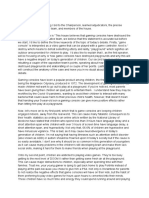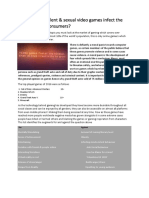0% found this document useful (0 votes)
11 views5 pagesGaming Article Student
The article discusses the perception of video game addiction among teenagers, arguing that the issue is more about societal constraints than actual addiction. It highlights how Gen Z faces increased monitoring and reduced freedoms, leading them to seek refuge in online gaming as one of the few spaces free from adult control. The authors suggest that rather than blaming video games for mental health issues, we should examine the broader societal factors contributing to these challenges.
Uploaded by
jean.gefflotCopyright
© © All Rights Reserved
We take content rights seriously. If you suspect this is your content, claim it here.
Available Formats
Download as PDF, TXT or read online on Scribd
0% found this document useful (0 votes)
11 views5 pagesGaming Article Student
The article discusses the perception of video game addiction among teenagers, arguing that the issue is more about societal constraints than actual addiction. It highlights how Gen Z faces increased monitoring and reduced freedoms, leading them to seek refuge in online gaming as one of the few spaces free from adult control. The authors suggest that rather than blaming video games for mental health issues, we should examine the broader societal factors contributing to these challenges.
Uploaded by
jean.gefflotCopyright
© © All Rights Reserved
We take content rights seriously. If you suspect this is your content, claim it here.
Available Formats
Download as PDF, TXT or read online on Scribd
/ 5
























































































